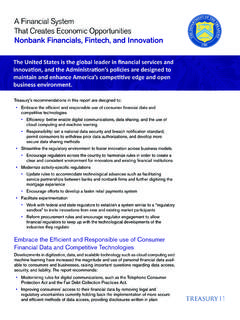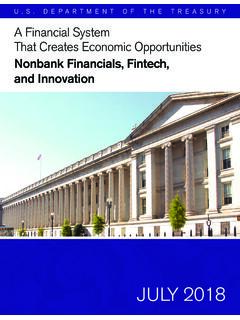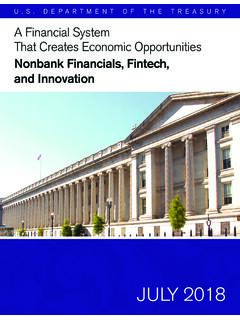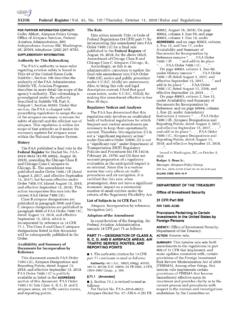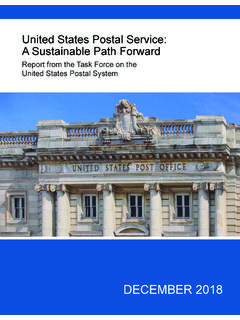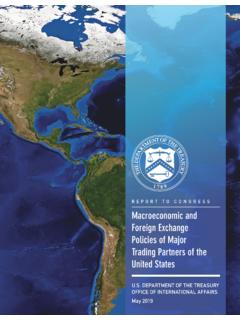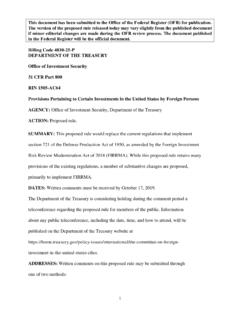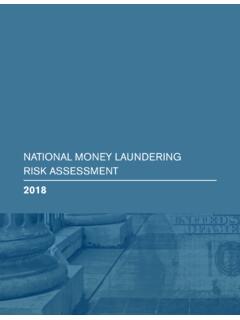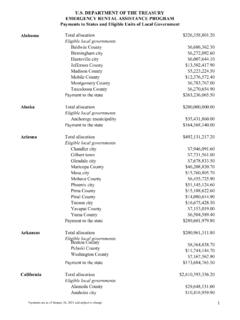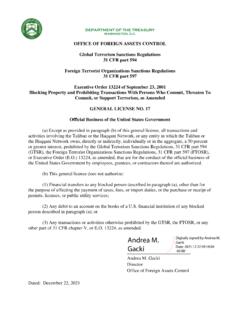Transcription of General Explanations of the
1 General Explanations of the Administration's Fiscal Year 2023. Revenue Proposals Department of the Treasury March 2022. TABLE OF CONTENTS. TABLE OF CONTENTS .. i Notes .. iii REVENUE PROPOSALS .. 1. Reform Business and International Taxation .. 2. Raise the Corporate Income Tax Rate to 28 Percent .. 2. Adopt the Undertaxed Profits Rule .. 4. Provide Tax Incentives for Locating Jobs and Business Activity in the United States and Remove Tax Deductions for Shipping Jobs 9. Prevent Basis Shifting by Related Parties through Partnerships .. 11. Conform Definition of Control with Corporate Affiliation Test .. 13. Expand Access to Retroactive Qualified Electing Fund Elections .. 14. Expand the Definition of Foreign Business Entity to Include Taxable Units .. 16. Support Housing and Urban Development .. 18. Make Permanent the New Markets Tax Credit .. 18. Allow Selective Basis Boosts for Bond-Financed Low-Income Housing Credit Projects 20. Modify Fossil Fuel Taxation .. 22. Eliminate Fossil Fuel Tax Preferences.
2 22. Modify Oil Spill Liability Trust Fund Financing and Superfund Excise Taxes .. 27. Strengthen Taxation of High-Income 29. Increase the Top Marginal Income Tax Rate for High Earners .. 29. Reform the Taxation of Capital Income .. 30. Impose a Minimum Income Tax on the Wealthiest Taxpayers .. 34. Support Families and Students .. 37. Make Adoption Tax Credit Refundable and Allow Certain Guardianship Arrangements to 37. Provide Income Exclusion for Student Debt 39. Modify Estate and Gift Taxation .. 40. Modify Income, Estate and Gift Tax Rules for Certain Grantor Trusts .. 40. Require Consistent Valuation of Promissory 43. Improve Tax Administration for Trusts and Decedents' Estates .. 45. Limit Duration of Generation-Skipping Transfer Tax Exemption .. 48. Close 50. Tax Carried (Profits) Interests as Ordinary Income .. 50. Repeal Deferral of Gain from Like-Kind Exchanges .. 52. Require 100 Percent Recapture of Depreciation Deductions as Ordinary Income for Certain Depreciable Real Property.
3 53. Limit a Partner's Deduction in Certain Syndicated Conservation Easement Transactions .. 56. Limit Use of Donor Advised Funds to Avoid Private Foundation Payout Requirement .. 58. Extend the Period for Assessment of Tax for Certain Qualified Opportunity Fund Investors .. 60. Establish an Untaxed Income Account Regime for Certain Small Insurance Companies 61. Expand Pro Rata Interest Expense Disallowance for Business-Owned Life Insurance .. 65. i General Explanations of the Administration's Fiscal Year 2023 Revenue Proposals Correct Drafting Errors in the Taxation of Insurance Companies Under the Tax Cuts and Jobs Act of 2017 .. 67. Define the Term Ultimate Purchaser for Purposes of Diesel Fuel Exportation .. 69. Improve Tax Administration and Compliance .. 70. Enhance Accuracy of Tax Information .. 70. Address Taxpayer Noncompliance with Listed Transactions .. 73. Amend the Centralized Partnership Audit Regime to Permit the Carryover of a Reduction in Tax that Exceeds a Partner's Tax Liability.
4 76. Incorporate Chapters 2/2A in Centralized Partnership Audit Regime Proceedings .. 77. Authorize Limited Sharing of Business Tax Return Information to Measure the Economy More 78. Impose an Affirmative Requirement to Disclose a Position Contrary to a Regulation .. 80. Require Employers to Withhold Tax on Failed Nonqualified Deferred Compensation Plans .. 81. Extend to Six Years the Statute of Limitations for Certain Tax Assessments .. 82. Expand and Increase Penalties for Noncompliant Return Preparation and E-Filing and Authorize IRS Oversight of Paid 83. Address Compliance in Connection with Tax Responsibilities of Expatriates .. 87. Simplify Foreign Exchange Gain or Loss Rules and Exchange Rate Rules for Individuals .. 90. Increase Threshold for Simplified Foreign Tax Credit Rules and Reporting .. 92. Modernize Rules, Including those for Digital Assets .. 93. Modernize Rules Treating Loans of Securities as Tax-Free to Include Other Asset Classes and Address Income Inclusion.
5 93. Provide for Information Reporting by Certain Financial Institutions and Digital Asset Brokers for Purposes of Exchange of Information .. 97. Require Reporting by Certain Taxpayers of Foreign Digital Asset Accounts .. 100. Amend the Mark-to-Market Rules for Dealers and Traders to Include Digital Assets .. 102. Improve Benefits Tax Administration .. 104. Clarify Tax Treatment of Fixed Indemnity Health Policies .. 104. Clarify Tax Treatment of On-Demand Pay Arrangements .. 106. Rationalize Funding for Post-Retirement Medical and Life Insurance Benefits .. 108. TABLE OF REVENUE ESTIMATES .. 109. ii General Explanations of the Administration's Fiscal Year 2023 Revenue Proposals NOTES. The revenue proposals are estimated relative to a baseline that incorporates all revenue provisions of Title XIII of 5376 (as passed by the House of Representatives on November 19, 2021), except Sec. 137601. The Administration's proposals are not intended to create any inferences regarding current law.
6 Within the General Explanations of the Administration's Fiscal Year 2023 Revenue Proposals, unless otherwise stated: AGI refers to Adjusted Gross Income Budget refers to the Fiscal Year 2023 Budget of the Government Code refers to the Internal Revenue Code C-CPI-U refers to the Chained Consumer Price Index for Urban Consumers IRA refers to Individual Retirement Account or Annuity IRS refers to the Internal Revenue Service Section refers to the respective section of the Internal Revenue Code Secretary refers to the Secretary of the Treasury Treasury refers to the Department of the Treasury TIN refers to Taxpayer Identification Number iii General Explanations of the Administration's Fiscal Year 2023 Revenue Proposals iv General Explanations of the Administration's Fiscal Year 2023 Revenue Proposals REVENUE PROPOSALS. In the Administration's Fiscal Year 2023 Budget, the President proposes a number of reforms that would enhance revenues, improve tax administration, and make the tax system more equitable and efficient.
7 The Budget includes proposals that reform corporate taxation, encourage housing and urban development, strengthen the taxation of high-income taxpayers, support families and students, close loopholes, and improve tax administration and compliance. Reforms to business and international taxation would collect sufficient revenue, build a fairer tax system, and reduce tax incentives that encourage profit shifting and offshoring. The Administration's proposals would also eliminate all fossil fuel subsidies. Substantial revenues come from strengthening the taxation of high-income taxpayers. Income tax rates for those with the highest incomes would increase. Reformed taxation of capital income would even the tax treatment of labor and capital income and eliminate a loophole that lets some capital gains income escape income taxation forever. For extremely wealthy taxpayers, a minimum income tax would require prepayment of taxes on unrealized capital gains, such that liquid taxpayers are taxed at a rate of at least 20 percent on their income including unrealized capital gains.
8 Similarly, several loopholes used by high-income taxpayers to avoid income, estate, and gift taxation would be closed, including the carried interest preference and the like- kind exchange real estate preference, which would be eliminated for those with the highest incomes. Finally, the Budget includes many proposals that would improve, modernize, and simplify tax administration. These include proposals that revise tax rules to include digital assets, proposals that improve the tax administration of employee benefits, and proposals that help the IRS address common tax administration issues. 1. General Explanations of the Administration's Fiscal Year 2023 Revenue Proposals REFORM BUSINESS AND INTERNATIONAL TAXATION. RAISE THE CORPORATE INCOME TAX RATE TO 28 PERCENT. Current Law Income of a business entity can be subject to Federal income tax in a manner that varies depending upon the classification of the entity for Federal income tax purposes. Most small businesses are owned by individuals and taxed as pass-through entities, meaning that their income is passed through to their owners who are taxed under the individual income tax system.
9 Most large businesses, including substantially all publicly traded businesses, are classified as C. corporations because these corporations are subject to the rules of subchapter C of chapter 1 of the Internal Revenue Code (Code), and accordingly pay an entity-level income tax. Additionally, taxable shareholders of such corporations generally pay Federal income tax on most distributions attributable to their ownership in the corporation. Some mid-sized businesses choose a pass- through form of entity classification (under subchapter K or subchapter S of chapter 1 of the Code) while others choose the C corporation form of entity classification. C corporations determine their taxable income, credits, and tax liability according to the Code and regulations promulgated thereunder. The Tax Cuts and Jobs Act of 2017 replaced a graduated tax schedule (with most corporate income taxed at a marginal and average rate of 35. percent) with a flat tax of 21 percent applied to all C corporations.
10 Reasons for Change Raising the corporate income tax rate is an administratively simple way to raise revenue to pay for the Administration's infrastructure proposals and other longstanding fiscal priorities. A. corporate tax rate increase can expand the progressivity of the tax system and help reduce income inequality. Additionally, a significant share of the effects of the corporate tax increase would be borne by foreign investors. Therefore, some of the revenue raised by this proposal would result in no additional Federal income tax burden on persons. Also, the majority of income from capital investments in domestic C corporations is untaxed by the government at the shareholder level, so the corporate tax is a primary mechanism for taxing such capital income. Furthermore, many multinational corporations pay effective tax rates that are far below the statutory rate, due in part to low-taxed foreign income. The proposal would keep the global intangible low-taxed income (GILTI) deduction constant, raising the GILTI rate in proportion to the increase in the corporate rate.
